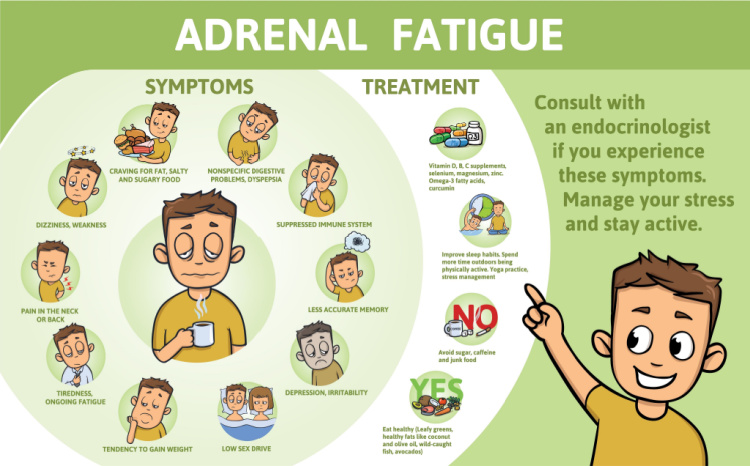What Is Adrenal Fatigue?
Did you know that long-term stress might impair your body’s capacity to recover from emotional, mental, and physical stress? Most people have probably experienced adrenal fatigue at some point in their lives. A number of illnesses can have symptoms that are similar to those of adrenal fatigue since the adrenals have an impact on so many different parts of the body.
Doctors sometimes ignore the signs of adrenal exhaustion, such as brain fog, moodiness, and difficulty sleeping, which can be suggestive of a wide range of illnesses. However, more and more people are beginning to understand that a confluence of these health problems frequently denotes the beginning of adrenal fatigue.
Your general health may be greatly affected if you have adrenal exhaustion. Fortunately, by concentrating on your nutritional intake and lifestyle choices, you may naturally alleviate this problem.

Adrenal Fatigue: What Is It?
The chiropractor and naturopath Dr. James L. Wilson coined the term “adrenal exhaustion” in 1998. He reasoned that prolonged stress could overstimulate the adrenal glands, or “adrenals,” resulting in an unstable amount of cortisol (the stress hormone), in the blood.
People with adrenal exhaustion frequently have insufficient DHEA, the “parent hormone” that is responsible for the production of numerous essential hormones in the body.
According to Dr. Wilson, adrenal exhaustion progresses differently throughout the day:
-You wake up and require a considerable amount of coffee to function.
-In the early hours of the day, you finally feel more energized.
-Your energy levels then plummet at about 2 o’clock, rebound at 6 o’clock, and then drop once more at 9 o’clock.
-At 11 p.m., your energy levels ultimately surge once more.

Adrenal Fatigue: Is It Real?
The main challenge in identifying or diagnosing adrenal exhaustion is the difficulty to separate its signs and patterns from those of other diseases. Sadly, the lack of specificity in the criteria for this condition has resulted in a lot of debate on the subject, despite the fact that cortisol and hormones by their very nature have widespread effects.
Stress hormone levels frequently fall within what would be considered “within the normal range,” making a diagnosis for this disorder challenging even if the symptoms are obvious to the people who are affected by it.

Symptoms
What occurs when the adrenal glands fail to produce hormones effectively?
Every physical function is impacted, and the typical “get-up-and-go” you get from them diminishes as adrenal hormone levels fluctuate excessively.
Signs of adrenal exhaustion include:
-Hormone imbalance
-Brain fog
-Weight gain
-Hair loss
-Hormone imbalance
-Chronic fatigue
-Weakened stress response
-Insulin sensitivity
-Lightheadedness
-Decreased libido/sex drive
-Anxiety and depression
-Moodiness
-Loss of bone or muscle
-Skin conditions
-Sleep apnea and other sleep disorders
-Cravings for salty and sweet foods
-Reduced appetite
If you’ve experienced any of these side symptoms of adrenal exhaustion, take note, because there are natural ways to maintain and heal your adrenal system.

Natural Solutions
Adrenal fatigue may be treated conventionally or naturally. The first step is to diagnose the issue, which can be challenging because the majority of individuals who have adrenal fatigue often spend too much time only managing their symptoms.
Among the natural treatments for adrenal exhaustion are:
-lowering the impact of stress on your body and mind
-avoid negative thinking
-refueling your body with nutritious foods, vitamins, and mental practices
-eliminating toxins
The solution to your question, “How can I aid my adrenal glands?” might be easier to answer than you think. Adrenal fatigue treatment is quite similar to healthy, healing diets.
Include the following foods in your diet:
-Coconut
-Avocado and other healthy fats
-Cruciferous plants (cauliflower, broccoli, Brussels sprouts, etc.)
-Large fish (e.g., wild-caught salmon)
-Chicken and turkey
-Bone bouillon
-Seeds such as flax, chia, and pumpkin
-Olives
-Nuts, including almonds and walnuts
-Kelp and algae
-Himalayan or Celtic sea salt
-Foods fermented with probiotics
These foods are nutrient-dense, low in sugar, and include healthy fats and fiber, which aid in overcoming adrenal exhaustion. Remove inflammatory foods from your diet, such as sugar and excessive carbohydrates, and replace them with a variety of colorful, plant-based foods, free-range lean meats, and lots of healthy fats to naturally combat adrenal fatigue.
